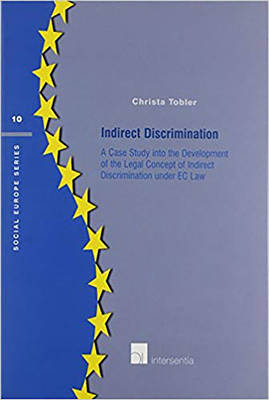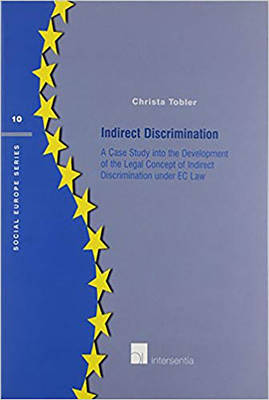
En raison d'une grêve chez bpost, votre commande pourrait être retardée. Vous avez besoin d’un livre rapidement ? Nos magasins vous accueillent à bras ouverts !
- Retrait gratuit dans votre magasin Club
- 7.000.000 titres dans notre catalogue
- Payer en toute sécurité
- Toujours un magasin près de chez vous
En raison de la grêve chez bpost, votre commande pourrait être retardée. Vous avez besoin d’un livre rapidement ? Nos magasins vous accueillent à bras ouverts !
- Retrait gratuit dans votre magasin Club
- 7.000.0000 titres dans notre catalogue
- Payer en toute sécurité
- Toujours un magasin près de chez vous
Indirect Discrimination
A Case Study Into the Development of the Legal Concept of Indirect Discrimination Under EC Law Volume 10
Christa Tobler
129,00 €
+ 258 points
Description
Introduced into European Community law by the Court of Justice through its case law in the field of free movement of workers, the legal concept of indirect discrimination has evolved into one with far wider and greater relevance to many other areas of EC law as well. Nonetheless, today the very meaning of the concept and its practical implications are often far from well understood. This book analyses the concept of indirect discrimination in a broad and comparative context, which encompasses both economic and social law.
The subject is approached in such a manner that scholars, practitioners, and merely interested readers can profit from the opportunity to examine the development of the legal concept of indirect discrimination as well as its relationship to other important concepts under EC law. The study asks and offers answers well informed by case law, legislation, and the views of other commentators to the issues: Why was such a legal concept as indirect discrimination called for originally? What did this concept mean then, and what does it mean today? Given the many developments that have taken place in the conceptual framework of EC law, does a need for the concept of indirect discrimination still exist today?Spécifications
Parties prenantes
- Auteur(s) :
- Editeur:
Contenu
- Nombre de pages :
- 516
- Langue:
- Anglais
- Collection :
- Tome:
- n° 10
Caractéristiques
- EAN:
- 9789050954587
- Date de parution :
- 05-07-05
- Format:
- Livre broché
- Format numérique:
- Trade paperback (VS)
- Dimensions :
- 165 mm x 241 mm
- Poids :
- 861 g

Les avis
Nous publions uniquement les avis qui respectent les conditions requises. Consultez nos conditions pour les avis.






